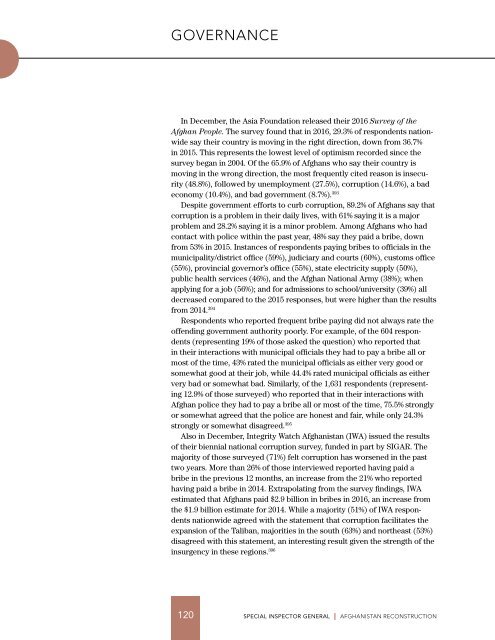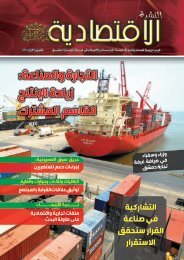SIGAR
2017-01-30qr
2017-01-30qr
You also want an ePaper? Increase the reach of your titles
YUMPU automatically turns print PDFs into web optimized ePapers that Google loves.
GOVERNANCE<br />
In December, the Asia Foundation released their 2016 Survey of the<br />
Afghan People. The survey found that in 2016, 29.3% of respondents nationwide<br />
say their country is moving in the right direction, down from 36.7%<br />
in 2015. This represents the lowest level of optimism recorded since the<br />
survey began in 2004. Of the 65.9% of Afghans who say their country is<br />
moving in the wrong direction, the most frequently cited reason is insecurity<br />
(48.8%), followed by unemployment (27.5%), corruption (14.6%), a bad<br />
economy (10.4%), and bad government (8.7%). 393<br />
Despite government efforts to curb corruption, 89.2% of Afghans say that<br />
corruption is a problem in their daily lives, with 61% saying it is a major<br />
problem and 28.2% saying it is a minor problem. Among Afghans who had<br />
contact with police within the past year, 48% say they paid a bribe, down<br />
from 53% in 2015. Instances of respondents paying bribes to officials in the<br />
municipality/district office (59%), judiciary and courts (60%), customs office<br />
(55%), provincial governor’s office (55%), state electricity supply (50%),<br />
public health services (46%), and the Afghan National Army (38%); when<br />
applying for a job (56%); and for admissions to school/university (39%) all<br />
decreased compared to the 2015 responses, but were higher than the results<br />
from 2014. 394<br />
Respondents who reported frequent bribe paying did not always rate the<br />
offending government authority poorly. For example, of the 604 respondents<br />
(representing 19% of those asked the question) who reported that<br />
in their interactions with municipal officials they had to pay a bribe all or<br />
most of the time, 43% rated the municipal officials as either very good or<br />
somewhat good at their job, while 44.4% rated municipal officials as either<br />
very bad or somewhat bad. Similarly, of the 1,631 respondents (representing<br />
12.9% of those surveyed) who reported that in their interactions with<br />
Afghan police they had to pay a bribe all or most of the time, 75.5% strongly<br />
or somewhat agreed that the police are honest and fair, while only 24.3%<br />
strongly or somewhat disagreed. 395<br />
Also in December, Integrity Watch Afghanistan (IWA) issued the results<br />
of their biennial national corruption survey, funded in part by <strong>SIGAR</strong>. The<br />
majority of those surveyed (71%) felt corruption has worsened in the past<br />
two years. More than 26% of those interviewed reported having paid a<br />
bribe in the previous 12 months, an increase from the 21% who reported<br />
having paid a bribe in 2014. Extrapolating from the survey findings, IWA<br />
estimated that Afghans paid $2.9 billion in bribes in 2016, an increase from<br />
the $1.9 billion estimate for 2014. While a majority (51%) of IWA respondents<br />
nationwide agreed with the statement that corruption facilitates the<br />
expansion of the Taliban, majorities in the south (63%) and northeast (53%)<br />
disagreed with this statement, an interesting result given the strength of the<br />
insurgency in these regions. 396<br />
120<br />
SPECIAL INSPECTOR GENERAL I AFGHANISTAN RECONSTRUCTION







